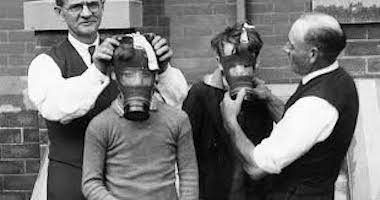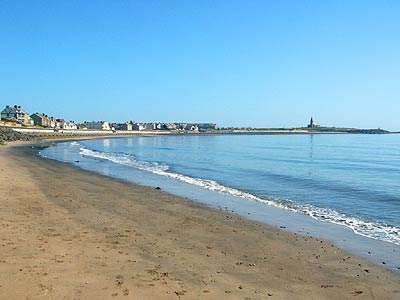World War 2 in Newbiggin by the Sea.
A recollection of daily events by Alan Thompson.
World War 2. The siren would blast the alarm across the town. The noise was unmissable-an air raid warning-the German bombers were coming. My Dad would pick me up from my bed by the light of a small oil lamp. He would clutch me to his chest. My Mother would uplift my baby Brother and hold him close in a blanket then my Mum and Dad would run through the dark streets in the cold night air to the home of my Dad’s Brother, Uncle Bill, who had built an air raid shelter beneath the front room of his house.
There were two bunk beds in the cellar which was very small so we would all sit huddled together in the candle light until the siren went off again to signal the ‘ALL CLEAR’ which meant the raid by the German bombers was over. Despite being only four and a half or five years old I think I remember this so well because the fear felt by everyone was so intense.
Throughout World War 2 the whole country was in “Blackout” at night which meant that no light from inside buildings was allowed and there were severe penalties for people who, for instance, left their curtains open when there was a light on or who opened a door without switching the lights off first. After dusk the whole of the United Kingdom was in darkness. There were no street lights and all road vehicles had shades over their lamps to deflect the light on to the road.
Each day families all over the country huddled round the radio (the wireless as it was called then) to hear the latest news; I can still remember the newsreader’s voice “this is the BBC Home Service here is the six O’clock news read by Alvar Liddell”.
At the beginning of the World War 2 the news was always grim as the Germans, the Nazi’s, conquered country after country. By June 1940 the Germans had conquered all of Europe and the British stood alone. Our brave soldiers who had resisted the German advance in Europe had to be rescued from France and miraculously every seaworthy vessel from leisure craft to fishing boats to Royal Navy destroyers crossed the English Channel to assist in the evacuation. Some boats rescued six or seven whilst bigger vessels rescued hundreds and almost 350,000 British, French and Belgian soldiers were saved.
The evacuation was known as the “Miracle of Dunkirk” and it set the tone for the war – if the Germans invaded Great Britain, the British would be ready and the British would not be defeated.
Despite the brave face everyone was fearful and they knew that the United Kingdom would be attacked next but no one knew where the Germans would invade so heavy guns were installed along the coast, concrete anti-tank blocks were strewn around our beaches and barbed wire was in evidence all along the beaches. In our village of Newbiggin by the Sea our horse shoe shaped bay was closed to all. We could no longer go on the beach or swim in the sea. Only the fishermen had access to the sea so that they could bring back their catch to feed the people.
Food was very scarce and every day was a quest to find enough to eat. Our mother made great efforts to make nourishing meals out of everything that was available. Every piece of potato peel, turnip peel and other discarded food was saved for a pig or pigs and when the pig was slaughtered a portion of meat would be given to the donor usually in the form of pork sausage? Despite working at the pit six days a week and sometimes seven my Dad grew vegetables and soft fruit in his allotment garden and in our back garden. People grew food on every available piece of land. My Dad bought two newly hatched chicks and gave one each to me and my brother. Mine was called Blackie and the other was called Penny. When they were fully grown they produced an egg each on most days and that was very pleasing. My brother and I loved those hens.
My Grandmother, who we called Nana came to live with us for long periods and we loved that because she used to go to bed early and rise about six in the morning so that when we woke up she was downstairs making a proggy mat with clippings from old clothes. When we joined her she would put the frying pan on the open coal fire, spread beef fat (Called dripping) across slices of bread and then fry it until the bread was brown and crispy and then we would eat it. We had fried bread almost every day for breakfast. The best part of the breakfast with Nana mornings was her story telling; she collected every piece of news about the war and told us how our brave soldiers, sailors and airmen were fighting for our freedom.
In the village that I lived in many of the men, like my Dad, worked in the coal mines and the coal miners were exempt from being ‘called up’ to join the armed forces. The coal miners were an important part of the war effort because without coal our industries could not manufacture the guns and the weapons and the ships and the aircraft needed to defend our country. Many of the miners were angry that they couldn’t go to fight. In our village there were hundreds of soldiers who were being trained to defend the country. They were billeted in church halls and each day they would be marched around the town and the children would copy them marching which was great fun. Despite the fun for the children the adults, miners and soldiers prepared for the invasion.
The invasion never came because our Royal Air Force Pilots flying Spitfires and Hurricanes repelled the German Air Force in the skies over the English Channel and the invasion did not come, however throughout the war German bombers raided our towns and cities killing and injuring many people and destroying many buildings.
Only one bomb was dropped in Newbiggin by the Sea
Throughout the five years of the World War 2 our local cinema used to have matinee’s for the children. We would go to ‘the pictures’ to see funny men called Laurel and Hardy or Abbot and Costello or the Three Stooges. The cinema used to erupt with laughter as they children roared at their antics. The funny men always preceded the main film which was usually a cowboy film and when we came out of the cinema we would play Cowboys and Indians all the way home.
World War 2 recollections.
To be continued ……….


